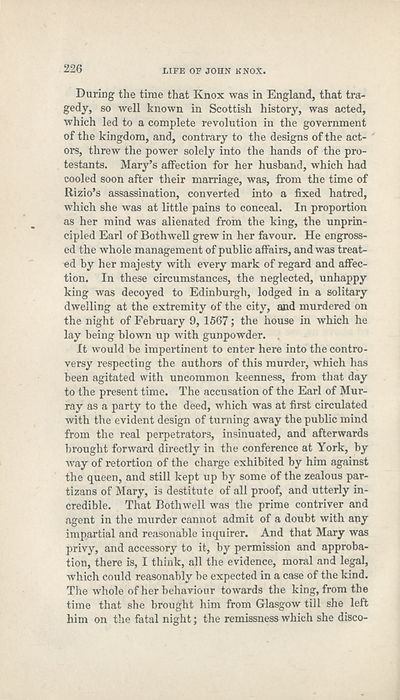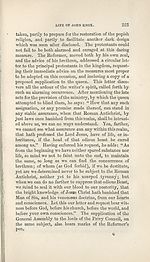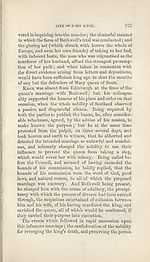Download files
Complete book:
Individual page:
Thumbnail gallery: Grid view | List view

226
LIFE OF JOHN KNOX.
During the time that Knox was in England, that tra¬
gedy, so well known in Scottish history, was acted,
which led to a complete revolution in the government
of the kingdom, and, contrary to the designs of the act¬
ors, threw the power solely into the hands of the pro-
testants. Mary’s affection for her husband, which had
cooled soon after their mamage, was, from the time of
Rizio’s assassination, converted into a fixed hatred,
which she was at little pains to conceal. In proportion
as her mind was alienated from the king, the unprin¬
cipled Earl of Both well grew in her favour. He engross¬
ed the whole management of public affairs, and was treat¬
ed by her majesty with every mark of regard and affec¬
tion. In these circumstances, the neglected, unhappy
king was decoyed to Edinburgh, lodged in a solitary
dwelling at the extremity of the city, and murdered on
the night of February 9, 1567; the house in which he
lay being blown up with gunpowder.
It would be impertinent to enter here into the contro¬
versy respecting the authors of this murder, which has
been agitated with uncommon keenness, from that day
to the present time. The accusation of the Earl of Mur¬
ray as a party to the deed, which was at first circulated
with the evident design of turning away the public mind
from the real perpetrators, insinuated, and afterwards
brought forward directly in the conference at York, by
way of retortion of the charge exhibited by him against
the queen, and still kept up by some of the zealous par-
tizans of Mary, is destitute of all proof, and utterly in¬
credible. That Both well was the prime contriver and
agent in the murder cannot admit of a doubt with any
impartial and reasonable inquirer. And that Mary was
privy, and accessory to it, by permission and approba¬
tion, there is, I think, all the evidence, moral and legal,
which could reasonably be expected in a case of the kind.
The whole of her behaviour towards the king, from the
time that she brought him from Glasgow till she left
him on the fatal night; the remissness which she disco-
LIFE OF JOHN KNOX.
During the time that Knox was in England, that tra¬
gedy, so well known in Scottish history, was acted,
which led to a complete revolution in the government
of the kingdom, and, contrary to the designs of the act¬
ors, threw the power solely into the hands of the pro-
testants. Mary’s affection for her husband, which had
cooled soon after their mamage, was, from the time of
Rizio’s assassination, converted into a fixed hatred,
which she was at little pains to conceal. In proportion
as her mind was alienated from the king, the unprin¬
cipled Earl of Both well grew in her favour. He engross¬
ed the whole management of public affairs, and was treat¬
ed by her majesty with every mark of regard and affec¬
tion. In these circumstances, the neglected, unhappy
king was decoyed to Edinburgh, lodged in a solitary
dwelling at the extremity of the city, and murdered on
the night of February 9, 1567; the house in which he
lay being blown up with gunpowder.
It would be impertinent to enter here into the contro¬
versy respecting the authors of this murder, which has
been agitated with uncommon keenness, from that day
to the present time. The accusation of the Earl of Mur¬
ray as a party to the deed, which was at first circulated
with the evident design of turning away the public mind
from the real perpetrators, insinuated, and afterwards
brought forward directly in the conference at York, by
way of retortion of the charge exhibited by him against
the queen, and still kept up by some of the zealous par-
tizans of Mary, is destitute of all proof, and utterly in¬
credible. That Both well was the prime contriver and
agent in the murder cannot admit of a doubt with any
impartial and reasonable inquirer. And that Mary was
privy, and accessory to it, by permission and approba¬
tion, there is, I think, all the evidence, moral and legal,
which could reasonably be expected in a case of the kind.
The whole of her behaviour towards the king, from the
time that she brought him from Glasgow till she left
him on the fatal night; the remissness which she disco-
Set display mode to:
![]() Universal Viewer |
Universal Viewer | ![]() Mirador |
Large image | Transcription
Mirador |
Large image | Transcription
| Antiquarian books of Scotland > Scotland/Scots > Life of John Knox ; and, The life of Alexander Henderson > (244) |
|---|
| Permanent URL | https://digital.nls.uk/131835232 |
|---|
| Description | Thousands of printed books from the Antiquarian Books of Scotland collection which dates from 1641 to the 1980s. The collection consists of 14,800 books which were published in Scotland or have a Scottish connection, e.g. through the author, printer or owner. Subjects covered include sport, education, diseases, adventure, occupations, Jacobites, politics and religion. Among the 29 languages represented are English, Gaelic, Italian, French, Russian and Swedish. |
|---|

